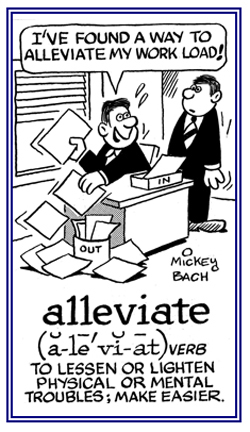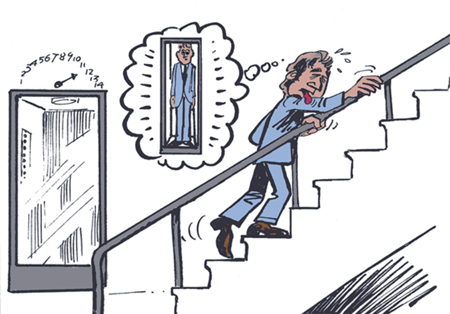lev-, levi-
(Latin: light in weight, lightness; to raise, to rise, to lift)
alleviate (verb), alleviates; alleviated; alleviating
1. To make something, like pain or hardship, more bearable or less severe: The injection the doctor gave Susan was intended to alleviate the pain caused by her infected tooth.
2. To make easier to endure; to lessen; to mitigate: Jim found that by keeping busy it helped to alleviate his sadness that was caused by the death of his lovable dog.
3. From Late Latin alleviatus, past participle of alleviare "to lighten", from Latin ad-, "to" plus levis, "light (in weight)".

© ALL rights are reserved.

© ALL rights are reserved.
Go to this Word A Day Revisited Index
2. To make easier to endure; to lessen; to mitigate: Jim found that by keeping busy it helped to alleviate his sadness that was caused by the death of his lovable dog.
3. From Late Latin alleviatus, past participle of alleviare "to lighten", from Latin ad-, "to" plus levis, "light (in weight)".


Go to this Word A Day Revisited Index
for a list of additional Mickey Bach illustrations.
1. The feeling that comes when something uncomfortable or unpleasant is removed or reduced: There was an alleviation of suffering after the doctor treated Manual for his aching back.
2. The act of relieving, or the state of being less uncomfortable, oppressive, or burdensome: Joe took an aspirin as an alleviation for his headache.
2. The act of relieving, or the state of being less uncomfortable, oppressive, or burdensome: Joe took an aspirin as an alleviation for his headache.
alleviative (adjective), more alleviative, most alleviative
Pertaining to the moderation of pain or sorrow by making it easier to endure: The doctor provided an alleviative treatment for the incurable disease that Mark had.
A person or something that diminishes or moderates an ailment or problem : The therapist was a great alleviator of Patrick's back pain.
The new tunnel under the river will be a wonderful alleviator of the traffic going across the river on the bridge.
elevate (verb), elevates; elevated; elevating
1. To move something to a higher place or position; to lift up: Susan decided to elevate the stool in the kitchen so she could work more easily while sitting at the counter.
2. To raise the volume, the intensity, or amplitude of something: Because Sharon could hardly hear the news on the radio, she elevated the level of sound so she could hear more distinctly.
3. To improve and rise to a higher position: After teaching for 10 years at her school and being the head of the English department, June was elevated to the position of vice-principal.
4. To upgrade to a more improved intellectual, cultural, or moral level: The parents’ opinion of their daughter’s boyfriend was elevated significantly when they saw how he well he treated her and how friendly he was towards them.
5. To lift the spirits of; to be overjoyed or jubilant: The thought of going to Venice for their honeymoon elevated and excited Grace when her fiancé made the suggestion.
6. From Latin elevatus, past participle of elevare, "lift up, raise," from ex-, "out" plus levare, "lighten, raise"; from levis, "light."
2. To raise the volume, the intensity, or amplitude of something: Because Sharon could hardly hear the news on the radio, she elevated the level of sound so she could hear more distinctly.
3. To improve and rise to a higher position: After teaching for 10 years at her school and being the head of the English department, June was elevated to the position of vice-principal.
4. To upgrade to a more improved intellectual, cultural, or moral level: The parents’ opinion of their daughter’s boyfriend was elevated significantly when they saw how he well he treated her and how friendly he was towards them.
5. To lift the spirits of; to be overjoyed or jubilant: The thought of going to Venice for their honeymoon elevated and excited Grace when her fiancé made the suggestion.
6. From Latin elevatus, past participle of elevare, "lift up, raise," from ex-, "out" plus levare, "lighten, raise"; from levis, "light."
1. The height to which something becomes higher or rises: When there is a strong storm the elevation of a river can exceed its limits and flood the whole area, even covering residential areas and causing severe damage.
2. The altitude of a place above sea level or ground level: The map showed the town in Germany to have an elevation of 350 meters, which was high enough to have some snow in the winter season.
3. A drawing or graphic representation that represents an object or structure as being produced geometrically on a vertical plane parallel to one of its sides: The client had approved the architect’s floor plans, so they could now start to work on the elevations to confirm the vertical alignments with the other nearby buildings.
2. The altitude of a place above sea level or ground level: The map showed the town in Germany to have an elevation of 350 meters, which was high enough to have some snow in the winter season.
3. A drawing or graphic representation that represents an object or structure as being produced geometrically on a vertical plane parallel to one of its sides: The client had approved the architect’s floor plans, so they could now start to work on the elevations to confirm the vertical alignments with the other nearby buildings.
Architects typically look at various options in the elevation of construction in order to review how the vertical alignments and proportions of the proposed building will work with the overall designs of neighboring structures.
4. The ability of a dancer to stay in the air while executing a step or the height attained: In ballet, Harry had the most outstancing talent because of his abilities to achieve extraordinary elevations during his performances.
1. A lifting device consisting of a platform or cage that is raised and lowered mechanically in a vertical shaft in order to move people from one floor to another in a building: Most department stores have elevators that allow shoppers to get from the main level to any of the other areas above it in a very short time without the need to walk up the stairs.
2. A storehouse for grain, equipped with a mechanism for taking in, lifting, and discharging the grain: While on their trip through the flatlands, Ted and his family could see many elevators or silos being used for keeping wheat, barley, or corn dry.
3. A machine with scoops or similar devices for hoisting something to a higher level: From the distance, the children watched the grain elevators unloading carloads of corn in the trains, one after the other.
4. A hinged flap, either of a pair on the rear portion of the horizontal stabilizing surface or tailplane of an aircraft, used to control the aircraft's up-and-down movement: The elevators on the wings of the planes are essential for their successful takeoffs and landings.
5. On an aircraft carrier, a mechanized platform that transports aircraft from a below-the-deck hangar up to the flight deck and vice versa: Several airplanes were being elevated during the day so the pilots could get more knowledge and skills.
6. A muscle that contracts to lift a part of the body: The jaw elevators raise the lower jaw to the upper jaw while chewing, making it possible for people to eat!
2. A storehouse for grain, equipped with a mechanism for taking in, lifting, and discharging the grain: While on their trip through the flatlands, Ted and his family could see many elevators or silos being used for keeping wheat, barley, or corn dry.
3. A machine with scoops or similar devices for hoisting something to a higher level: From the distance, the children watched the grain elevators unloading carloads of corn in the trains, one after the other.
4. A hinged flap, either of a pair on the rear portion of the horizontal stabilizing surface or tailplane of an aircraft, used to control the aircraft's up-and-down movement: The elevators on the wings of the planes are essential for their successful takeoffs and landings.
5. On an aircraft carrier, a mechanized platform that transports aircraft from a below-the-deck hangar up to the flight deck and vice versa: Several airplanes were being elevated during the day so the pilots could get more knowledge and skills.
6. A muscle that contracts to lift a part of the body: The jaw elevators raise the lower jaw to the upper jaw while chewing, making it possible for people to eat!
Music that is played in moving structures that carry people go up and down in buildings: Elevator music is often played in order to calm the shoppers if they happen to be anxious or this term can also be used for music played in public places, for example in shopping malls or in offices.
An abnormal dread or fear of being trapped in a moving platform, cage, or enclosed car that carries people and things up and down in a building or mine, etc.: Greg decided to take the staircase instead of the lift to get to his dentist’s office because he was suffering from elevatorphobia.


elevatory (adjective), more elevatory, most elevatory
Referring to a tendency to rise or to increase: The doctor was concerned about Mary's elevatory blood pressure.
A tall building for storing grain: The farmer took his harvested wheat to the grain elevator in order to keep it dry during the winter months.
The lack of significance to what is being discussed: Henry was talking about political irrelevancies which just didn't make any sense.
While making decisions on their next vacation trip, money was considered to be of irrelevance, because the couple won $20,000 in the lottery!
The lack of a relation or connection of something to a topic at hand: When all the vegetables and fruit at the stores are organically produced, then the term “organic” becomes an irrelevancy!
irrelevant (adjective), more irrelevant, most irrelevant
Not important nor relating to what is being discussed at the time: Marina's comments were irrelevant to the subject that was being considered during the project meetings.

© ALL rights are reserved.
Go to this Word A Day Revisited Index

Go to this Word A Day Revisited Index
so you can see more Mickey Bach illustrations.
irrelevantly (adverb), more irrelevantly, most irrelevantly
Not descriptive about what is going on: Henry was irrelevantly talking about the national budget and indicated his lack of knowledge about the subject.

